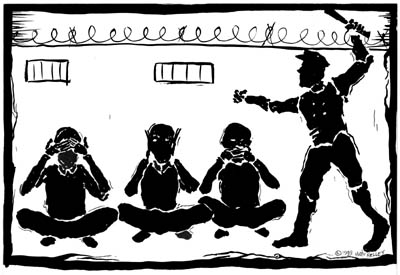 "Correctional officers look up, God loves you and so do we" reads the sign in front of Northside Baptist Church in Raiford, Florida. It reflects the controversy brewing inside the Florida State Prison just a half-mile away. Any reasonable citizen would think God is the only one who would love the nine prison guards accused of beating Frank Valdes to death inside the X-Wing of Florida State Prison. However in this small town, where the prison is the largest employer, most residents try to avoid the issue of officer violence entirely. Soon, however, it will be a hard bullet to dodge as the debate over the handling of the prisoners in the system becomes the center of several federal investigations around the country.
"Correctional officers look up, God loves you and so do we" reads the sign in front of Northside Baptist Church in Raiford, Florida. It reflects the controversy brewing inside the Florida State Prison just a half-mile away. Any reasonable citizen would think God is the only one who would love the nine prison guards accused of beating Frank Valdes to death inside the X-Wing of Florida State Prison. However in this small town, where the prison is the largest employer, most residents try to avoid the issue of officer violence entirely. Soon, however, it will be a hard bullet to dodge as the debate over the handling of the prisoners in the system becomes the center of several federal investigations around the country.
Breaking the "code of silence" presents the most formidable obstacle in the way of federal and state investigators' search for the truth. Even inmates, fearing that Valdes' fate awaits them, refuse to speak up about abuses at Florida State Prison.
However, with the help of Miami Attorney Don Cohn, at least thirteen prisoners at Florida State Prison, Butler Correctional, and New River Correctional Facility are coming forward to sign written affidavits about the physical abuses occurring there. Horrifying stories of beatings, torture, and abuse radiate from these houses of holding for a prison population which according to the warden of New River Correctional Facility (directly across from the main State Prison), is composed of 70-80% non-violent offenders.
Cohn became interested in the case after his client, Gary Waid began writing him letters of the abuse that occurs at the prison. Gary is a federal marijuana prisoner, who is serving a nine-year sentence for conspiracy to import marijuana. Gary Brooks Waid sits in the Florida prison system after he was traded to the state system last year under Executive Order #98-188 signed by Gov. Chiles. Thirty drug offenders, all model prisoners, were sent to Florida with then Governor Chiles claiming the deal was to save Florida money.
Attracting the attention of prison officials, Gary found himself stripped and placed in the "hole" after he wrote letters to the Miami Herald describing the masochistic and routine beatings occurring to other inmates. His official infraction remains listed as "typing." Apparently inmates must rely on good ol' Crayola in Florida state prisons to write letters. Gary's attorney responded by showing him how to collect affidavits from the hurt prisoners.
At least nineteen prisoners are talking to the press and Mr. Cohn about beatings, including one prisoner we will call Mr. Most (identity withheld for protection) who claims he was beaten so badly he was bleeding from every orifice in his body.
One very shocking prisoner affidavit claims that guards shouted obscenities and racial slurs such as, "You niggers are always stealing on the streets," as he was repeatedly kicked in the ribs. The prisoner also claims he never received medical attention for his injuries. One by one the other affidavits received by Cohn describe the tortures in blistering detail: knees to the groin, Mace to the eyes while already restrained, midnight beatings, and threats of death if anyone ever told.
One grandmother from Key West has taken on the banner for Gary and the beaten prisoners. Kay Lee, an activist for medical marijuana reform, has been inspired to camp out on the lawn of the Florida State Prison at least one Saturday per month until Warden Crosby meets a list of demands which she has created.
The demands, which ensure prisoners will not be beaten, and if they are, that someone will take responsibility to ensure it doesn't get repeated, have so far been avoided by the warden. Activists helping Kay have even been asked to leave from the roadside of the state road in front of the prison. Yet, Ms. Lee continues on in her quest. Just as Waid and Cohn continue in theirs.
While Cohn is examining his options for bringing civil suits against the Florida Department of Corrections on behalf of the beaten prisoners, the debate about prison guard violence has sparked new questions and resurrected old ones about the prison environment in America. There are many politicians out there that kowtow to ignorant millions of Archie Bunker wannabes. Unfortunately this is the 20% of American society who regularly go to the polls. Therefore, instead of solving the mental, economic, and social problems of prisoners, which reduce recidivism rates, U.S. executive officials subscribe to the mob mentality of revenge and punishment. This, in turn, gets them elected to cram more money in kickbacks for corporations like Wackenhut (the largest private prison management company in the United States).
According to Amnesty International, which used the 1998-1999 fiscal year to turn its attention to the sad state of prison conditions in the United States, "More than 1.7 million people are in prisons or jails in the USA. More than 60% are from racial or ethnic minorities. Over half are black. Since 1980 the number of inmates has more than tripled; the number of women inmates has quadrupled. Some 77,000 inmates are held in privately run institutions. There have been serious complaints about abuse of inmates and poor conditions in privately run facilities in a number of states."
 Reports of beatings in Michigan and Arizona, uncovered by Amnesty International, resulted in lawsuits by the Department of Justice in 1997. Abuses at a Pennsylvania prison reported by Amnesty International prison resulted in the termination of 20 officers in 1998.
Reports of beatings in Michigan and Arizona, uncovered by Amnesty International, resulted in lawsuits by the Department of Justice in 1997. Abuses at a Pennsylvania prison reported by Amnesty International prison resulted in the termination of 20 officers in 1998.
Many critics of the current prison system point, with good reason, to the Stanford prison experiments which took place in 1971. Seventy college students took on roles of prisoners, guards, and administrators to get an accurate assessment of prison life and how it affects otherwise normal people. The experiment had to be stopped early when, even though guards were constantly reminded not to resort to violence and dehumanization to maintain control of prisoners, on numerous occasions it happened. Stanford psychology professor Philip Zimbardo, who conducted the experiment remarks, "Prisons are failed social-political experiments" that consistently bring out the worst in relations between people "because the public is indifferent to what takes place in secret there, and politicians use them, fill them up as much as they can, to demonstrate only that they are tough on crime. ... They are as bad for the guards as the prisoners in terms of their destructive impact on self-esteem, sense of justice and human compassion."
Unfortunately, America's leaders have failed to learn from this experiment, which seems to have been dead-on accurate all those years ago. Until there is a major paradigm shift among those who determine the management of prisons, the training of guards, and the relationships with those housed in corrections facilities, this problem will continue to get worse. With the projections of many criminal justice experts, including the Department of Justice, that at least 10% of the U.S. population will be incarcerated by 2015, this problem may become an all too real nightmare for any one of us.
Email your feedback on this article to editor@impactpress.com.
Make an IMPACT


 "Correctional officers look up, God loves you and so do we" reads the sign in front of Northside Baptist Church in Raiford, Florida. It reflects the controversy brewing inside the Florida State Prison just a half-mile away. Any reasonable citizen would think God is the only one who would love the nine prison guards accused of beating Frank Valdes to death inside the X-Wing of Florida State Prison. However in this small town, where the prison is the largest employer, most residents try to avoid the issue of officer violence entirely. Soon, however, it will be a hard bullet to dodge as the debate over the handling of the prisoners in the system becomes the center of several federal investigations around the country.
"Correctional officers look up, God loves you and so do we" reads the sign in front of Northside Baptist Church in Raiford, Florida. It reflects the controversy brewing inside the Florida State Prison just a half-mile away. Any reasonable citizen would think God is the only one who would love the nine prison guards accused of beating Frank Valdes to death inside the X-Wing of Florida State Prison. However in this small town, where the prison is the largest employer, most residents try to avoid the issue of officer violence entirely. Soon, however, it will be a hard bullet to dodge as the debate over the handling of the prisoners in the system becomes the center of several federal investigations around the country.
